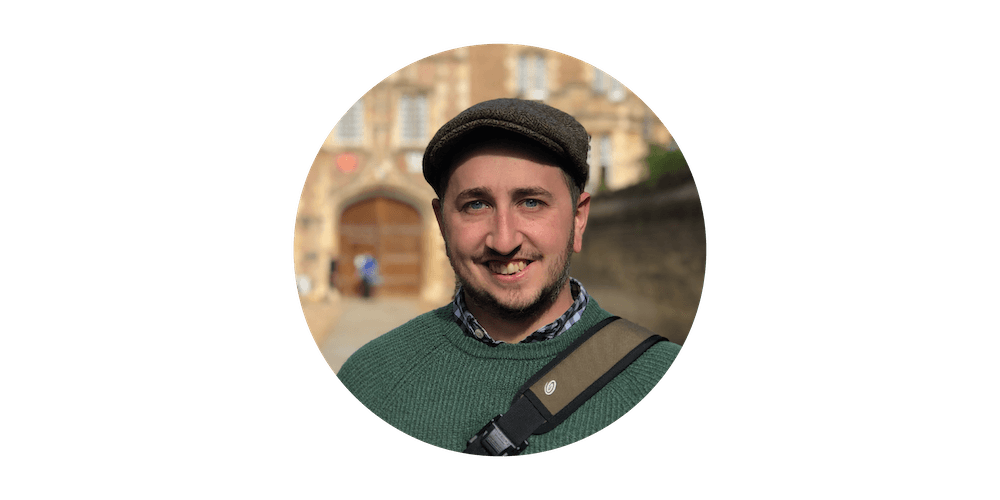Travis Wright is a PhD candidate at Cambridge University and a Tyndale House reader. He also teaches Greek and Hebrew to those new to Bible languages
“I started online tutoring simply because I loved Greek and Hebrew and was thrilled to be able to read Scripture with so much colour. Later I saw the need to demonstrate their power and importance to Christian ministry and mission. That’s why I started Biblingo Live [an online language-learning platform] with Andrew. It’s for everyone from homeschoolers and homemakers to scientists and seminarians.
Before I came to Tyndale House I was involved with mission work in inner-city Minneapolis, where I worked with men from criminal backgrounds with substance addictions. During that time, I took a BA in Biblical Studies. I did the same again for my MA in Biblical Studies, which I did while working in pastoral ministry at a church in North Carolina.
For my PhD I chose a topic that would allow me to spend most of my time studying biblical languages. I’m researching the grammar of Koine Greek, the form of Greek spoken at the time of the New Testament, by studying the Greek translation of the Old Testament, often called the Septuagint or LXX. I’ll be comparing the Greek version of Ezekiel to Greek papyri and inscriptions and other Koine literature. I don’t know what I’ll find yet!”

Tyndale House reader Andrew Keenan is a first-year PhD candidate at Cambridge University, and partners with Travis to teach Bible languages online
“I absolutely love biblical languages because there is something so exciting and beautiful about getting so close to the text. Setting up Biblingo Live with Travis, and watching people come to the same realisation, is such a privilege. It is all the more important to me because so few want to really learn the languages these days, so I try to get people reading the Bible text from day one.
Before coming to Cambridge to study I was working as a Library Assistant and Adjunct Professor at Lancaster Bible College (LBC) in Pennsylvania. I’m now doing a PhD focusing on the Greek translation of Jeremiah from the Septuagint, especially its vocabulary and grammar. I’ll spend a lot of time comparing the vocabulary and grammar of Greek Jeremiah with what we find in similar regions and from a similar time period in other Greek texts. In the past this field has been dominated by conclusions that stem more from researchers’ values than the text itself. I will be bringing some linguistics into my PhD with the ultimate aim of being able say a lot more about the vocabulary and grammar of Greek Jeremiah from a more objective analysis rather than from a value-driven perspective.”
Tell us about the authors who set you on your journey in biblical scholarship?
Travis: It was really through encountering the beauty and majesty of the Bible itself in its original languages that I became interested in biblical scholarship. Christo van der Merwe has spent his career studying Hebrew in order to assist Bible Translation. His A Biblical Hebrew Reference Grammar (2nd edition) demonstrates that sophisticated scholarship on the languages of the Bible can be deeply relevant to Christian service.
Stephen Levinsohn, who wrote Discourse Features of New Testament Greek, is a career Bible translator and linguist whose work is informed by profound personal learning about the world’s languages. His book inspired me to do similar “fieldwork” on the biblical languages.
Discourse Grammar of the Greek New Testament by Steve Runge was the first book to show me the value of modern linguistics for biblical exegesis, which then deepened my interest in the languages themselves. It also helped me see how traditional grammarians were the linguists of their day –– and that modern cutting-edge linguistics honours their tradition.
Andrew: Adolf Deissmann was one of the first scholars to take papyri and inscriptions and integrate them into our understanding of Greek in a systematic or meaningful way. For this reason, Deissmann remains one of the most influential scholars for my area of specialisation. Deissmann’s Bible Studies (1895) dispelled long-held notions about Greek and moved our field forward in an irreversible way. We are still building off his work today. This book is one to which I continually return.
Michael Kruger’s Canon Revisited was one of the most important books that I read as a young Christian and student. We often hear sceptical voices in the public square about the validity of the biblical text, but Kruger counters them with a calculated, informed, reasonable and unapologetically confessional response. Canon issues are complex, but Kruger set a model for not only good scholarship but Christian scholarship. Additionally it gave me an urge to dig deeper, to find creative solutions to long-standing issues and to think critically with as many tools as I can manage. I am profoundly indebted to this book for helping develop a sense of curiosity I wouldn’t otherwise have.
I know Travis chose Steve Runge’s Discourse Grammar of the Greek New Testament, and I would definitely count this as a significant inspiration for me too. Steve’s book saved my love for the languages. Greek didn’t come to me very easily at all and I didn’t enjoy the ways we were typically taught Greek in seminary. Then I was introduced to Runge’s grammar which provided a different way of viewing language — it was refreshing, creative and fun. This book single-handedly put me on the path that started me on my journey to Cambridge. I commend it to anyone interested in languages.
November 20, 2020
Notes
Biblingo Live is an online educational platform that aims to make biblical languages easier to learn with immersive software and tailored instruction. biblingo.org/live